| Listing 1 - 10 of 10 |
Sort by
|
Book
ISBN: 0674184769 Year: 2014 Publisher: Cambridge, MA : Harvard University Press,
Abstract | Keywords | Export | Availability | Bookmark
 Loading...
Loading...Choose an application
- Reference Manager
- EndNote
- RefWorks (Direct export to RefWorks)
This engaging book challenges the traditional notion that Japan was an isolated nation cut off from the outside world in the modern era. This familiar story of seclusion, argues master historian Marius B. Jansen, results from viewing the period soley in terms of Japan's ties with the West, at the expense of its relationship with closer Asian neighbors. Taking as his focus the port of Nagasaki and its thriving trade with China in the sixteenth through nineteenth centuries, Jansen not only corrects this misperception but offers an important analysis of the impact of the China trade on Japan's cultural, economic, and political life.
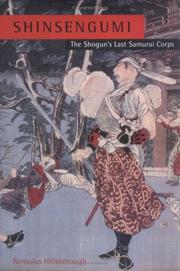
ISBN: 9780804836272 0804836272 Year: 2005 Publisher: Tokyo : Tuttle,
Abstract | Keywords | Export | Availability | Bookmark
 Loading...
Loading...Choose an application
- Reference Manager
- EndNote
- RefWorks (Direct export to RefWorks)
Book
ISBN: 4316358901 Year: 2002 Publisher: Tokyo : Kyoiku Shuppan,
Abstract | Keywords | Export | Availability | Bookmark
 Loading...
Loading...Choose an application
- Reference Manager
- EndNote
- RefWorks (Direct export to RefWorks)
Book
ISBN: 9784924971264 492497126X Year: 2009 Volume: 25 Publisher: Tokyo International house of Japan
Abstract | Keywords | Export | Availability | Bookmark
 Loading...
Loading...Choose an application
- Reference Manager
- EndNote
- RefWorks (Direct export to RefWorks)
National characteristics, Japanese. --- Japonais --- Japan --- Japon --- History --- Social life and customs --- Histoire --- Moeurs et coutumes --- Shoguns --- Politics and government --- J3360 --- J4140.60 --- J4000.60 --- Japan: History -- Kinsei, Edo, Tokugawa period, early modern (1600-1867) --- Japan: Sociology and anthropology -- cultural history -- Kinsei, Edo, Tokugawa period, early modern (1600-1867) --- Japan: Social history, history of civilization -- Kinsei, Edo, Tokugawa period, early modern (1600-1867) --- J4150.60 --- Japan - History - Tokugawa period, 1600-1868 --- Japan - Politics and government - 1600-1868
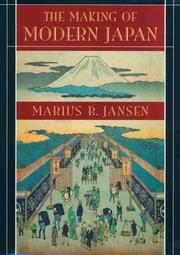
ISBN: 0674003349 0674009916 9780674009912 9780674003347 Year: 2000 Publisher: London Belknap press of Harvard university press
Abstract | Keywords | Export | Availability | Bookmark
 Loading...
Loading...Choose an application
- Reference Manager
- EndNote
- RefWorks (Direct export to RefWorks)
Magisterial in vision, sweeping in scope, this monumental work presents a seamless account of Japanese society during the modern era, from 1600 to the present. A distillation of more than 50 years' engagement with Japan and its history, it is the crowning work of our leading interpreter of the modern Japanese experience. Since 1600 Japan has undergone three periods of wrenching social and institutional change, following the imposition of hegemonic order on feudal society by the Tokugawa shogun; the opening of Japan's ports by Commodore Perry; and defeat in World War II. "The Making of Modern Japan" charts these changes: the social engineering begun with the founding of the shogunate in 1600, the emergence of village and castle towns with consumer populations, and the diffusion of samurai values in the culture. Jansen covers the making of the modern state, the adaptation of Western models, growing international trade, the broadening opportunity in Japanese society with industrialization, and the postwar occupation reforms imposed by General MacArthur. Throughout, the book gives voice to the individuals and views that have shaped the actions and beliefs of the Japanese, with writers, artists and thinkers as well as political leaders given their due. The story this book tells, though marked by profound changes, is also one of remarkable consistency, in which continuities outweigh upheavals in the development of society, and successive waves of outside influence have only served to strengthen a sense of what is unique and native to Japanese experience. "The Making of Modern Japan" takes us to the core of this experience as it illuminates one of the contemporary world's most compelling transformations.
History of Asia --- anno 1600-1699 --- anno 1700-1799 --- anno 1800-1999 --- Japan --- J3360 --- J3371 --- Japan: History -- Kinsei, Edo, Tokugawa period, early modern (1600-1867) --- Japan: History -- Kindai, modern -- Meiji period (1868-1912) --- -JP / Japan - Japon --- Nihon --- Nippon --- Iapōnia --- Zhāpān --- I︠A︡ponii︠a︡ --- Yapan --- Japão --- Japam --- Mư̄ang Yīpun --- Prathēt Yīpun --- Yīpun --- Jih-pen --- Riben --- Government of Japan --- 92 --- JP / Japan - Japon --- Geschiedenis. --- Histoire. --- History. --- 92 Geschiedenis. --- 92 Histoire. --- 92 History. --- Geschiedenis --- History --- Japon --- Histoire --- Japan - History - Tokugawa period, 1600-1868 --- Japan - History - Meiji period, 1868-1912 --- 1600-1868 (Époque des Tokugawa) --- 1868-1912 (Ère Meiji)
Book
ISBN: 9780199930159 0199930155 Year: 2014 Publisher: New York Oxford University Press
Abstract | Keywords | Export | Availability | Bookmark
 Loading...
Loading...Choose an application
- Reference Manager
- EndNote
- RefWorks (Direct export to RefWorks)
A Modern History of Japan paints a portrait of the last two centuries of Japanese history. It takes students from the days of the shogunate -- the overlordship of the Tokugawa family -- through the modernizing revolution launched by midlevel samurai in the late nineteenth century; the adoption of Western hairstyles, clothing, and military organization; and the nation's first experiments with mass democracy after World War I. Andrew Gordon offers a synthesis of Japan's passage through militarism, World War II, the American occupation, and the subsequent economic rollercoaster.
J3360 --- J3370 --- J3380 --- J3390 --- J4000.60 --- J4000.70 --- J4000.80 --- J4000.90 --- Japan: History -- Kinsei, Edo, Tokugawa period, early modern (1600-1867) --- Japan: History -- Kindai, modern period (1868 [1850s]- ) --- Japan: History -- Gendai, modern, 20th century --- Japan: History -- Gendai, modern -- postwar Shōwa (1945- ), Heisei period (1989- ), contemporary --- Japan: Social history, history of civilization -- Kinsei, Edo, Tokugawa period, early modern (1600-1867) --- Japan: Social history, history of civilization -- Kindai (1850s- ), bakumatsu, Meiji, Taishō --- Japan: Social history, history of civilization -- Gendai (1926- ), Shōwa period, 20th century --- Japan: Social history, history of civilization -- postwar Shōwa (1945- ), Heisei period (1989- ), contemporary --- Japan --- History --- Japan - History - 1868 --- -Japan - History - Tokugawa period, 1600-1868
Book
ISBN: 9780415443562 9780203885628 0415443563 0203885627 0415603714 1134067666 9786611900199 1281900192 9781134067619 9781134067657 9781134067664 9780415603713 Year: 2009 Volume: 4 Publisher: London Routledge
Abstract | Keywords | Export | Availability | Bookmark
 Loading...
Loading...Choose an application
- Reference Manager
- EndNote
- RefWorks (Direct export to RefWorks)
Christianity and politics --- Christianity --- History. --- Controversial literature --- History and criticism. --- Japan --- History --- J1920.60 --- J1921.10 --- J1926.70 --- J4010 --- Religions --- Church history --- Church and politics --- Politics and Christianity --- Politics and the church --- Political science --- Controversial literature&delete& --- History and criticism --- Japan: Religion -- Christianity -- history -- Kinsei, Edo, Tokugawa period, early modern (1600-1867) --- Japan: Religion -- Christianity -- policy, legislation, guidelines, codes of behavior --- Japan: Religion -- Christianity -- relations -- state and politics --- Japan: Social sciences in general -- ideology, socio-political and socio-economic movements --- Political aspects --- Christianity and politics - Japan - History. --- Christianity - Japan - Controversial literature - History and criticism. --- Japan - History - Tokugawa period, 1600-1868. --- Japan - History - Meiji period, 1868-1912.
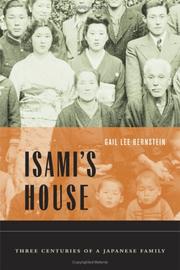
ISBN: 9780520246973 1423731492 1282358332 0520939425 1598758020 0520246977 9780520939424 9781423731498 9780520239746 0520239741 9781598758023 9786612358333 Year: 2005 Publisher: Berkeley : University of California Press,
Abstract | Keywords | Export | Availability | Bookmark
 Loading...
Loading...Choose an application
- Reference Manager
- EndNote
- RefWorks (Direct export to RefWorks)
In this powerful and evocative narrative, Gail Lee Bernstein vividly re-creates the past three centuries of Japanese history by following the fortunes of a prominent Japanese family over fourteen generations. The first of its kind in English, this book focuses on Isami, the eleventh generation patriarch and hereditary village head. Weaving back and forth between Isami's time in the first half of the twentieth century and his ancestors' lives in the Tokugawa and Meiji eras, Bernstein uses family history to convey a broad panoply of social life in Japan since the late 1600's. As the story unfolds, she provides remarkable details and absorbing anecdotes about food, famines, peasant uprisings, agrarian values, marriage customs, child-rearing practices, divorces, and social networks. Isami's House describes the role of rural elites, the architecture of Japanese homes, the grooming of children for middle-class life in Tokyo, the experiences of the Japanese in Japan's wartime empire and on the homefront, the aftermath of the country's defeat, and, finally, the efforts of family members to rebuild their lives after the Occupation. The author's forty-year friendship with members of the family lends a unique intimacy to her portrayal of their history. Readers come away with an inside view of Japanese family life, a vivid picture of early modern and modern times, and a profound understanding of how villagers were transformed into urbanites and what was gained, and lost, in the process.
Matsuura family. --- Japan --- History --- J2283 --- J4170 --- Japan: Genealogy and biography -- genealogy, family biographies --- Japan: Sociology and anthropology -- family --- HISTORY / Asia / General. --- Matsuura family.. --- Japan -- History -- Tokugawa period, 1600-1868.. --- Japan -- History -- 1868-. --- 1600s. --- 20th century. --- agrarian values. --- family and culture. --- family generations. --- family historians. --- family history. --- genealogy. --- hereditary lines. --- isami. --- japan. --- japanese ancestry. --- japanese culture. --- japanese families. --- japanese family life. --- japanese history. --- marriage customs. --- meiji era. --- middle class life. --- multigenerational. --- nonfiction. --- retrospective. --- social life. --- social networks. --- tokugawa era. --- tokyo. --- traditional families. --- urbanization. --- village leaders. --- wartime japan.
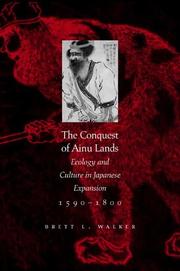
ISBN: 9780520248342 0520248341 0520227360 9780520227361 Year: 2006 Publisher: Berkeley University of California press
Abstract | Keywords | Export | Availability | Bookmark
 Loading...
Loading...Choose an application
- Reference Manager
- EndNote
- RefWorks (Direct export to RefWorks)
This model monograph is the first scholarly study to put the Ainu--the native people living in Ezo, the northernmost island of the Japanese archipelago--at the center of an exploration of Japanese expansion during the seventeenth and eighteenth centuries, the height of the Tokugawa shogunal era. Inspired by "new Western" historians of the United States, Walker positions Ezo not as Japan's northern "frontier" but as a borderland or middle ground. By framing his study between the cultural and ecological worlds of the Ainu before and after two centuries of sustained contact with the Japanese, the author demonstrates with great clarity just how far the Ainu were incorporated into the Japanese political economy and just how much their ceremonial and material life--not to mention disease ecology, medical culture, and their physical environment--had been infiltrated by Japanese cultural artifacts, practices, and epidemiology by the early nineteenth century. Walker takes a fresh and original approach. Rather than presenting a mere juxtaposition of oppression and resistance, he offers a subtle analysis of how material and ecological changes induced by trade with Japan set in motion a reorientation of the whole northern culture and landscape. Using new and little-known material from archives as well as Ainu oral traditions and archaeology, Walker poses an exciting new set of questions and issues that have yet to be approached in so innovative and thorough a fashion.
J4207 --- J3363 --- J3480 --- J7510 --- J4140.60 --- J4000.60 --- Ainu --- -Human ecology --- -Ecology --- Environment, Human --- Human beings --- Human environment --- Ecology --- Ecological engineering --- Human geography --- Nature --- Ainos --- Ethnology --- Japan: Sociology and anthropology -- communities -- native ethnicity and race --- Japan: History -- Kinsei, Edo period -- seclusion, sakoku (1639-1854), 18th century general --- Japan: Geography and local history -- Hokkaidō prefecture (Ezo) --- Japan: Natural sciences and technology -- biology -- ecology (general) --- Japan: Sociology and anthropology -- cultural history -- Kinsei, Edo, Tokugawa period, early modern (1600-1867) --- Japan: Social history, history of civilization -- Kinsei, Edo, Tokugawa period, early modern (1600-1867) --- History --- Social aspects --- Effect of environment on --- Effect of human beings on --- Hokkaido (Japan) --- Japan --- History. --- -Aïnou (Peuple d'Asie) --- Hokkaido (Japon) --- Ainu. --- Ainu-- History. --- Hokkaido (Japan) - History. --- Human ecology - Japan - Hokkaido. --- Aïnou (Peuple d'Asie) --- Nihon --- Nippon --- Iapōnia --- Zhāpān --- I︠A︡ponii︠a︡ --- Yapan --- Japon --- Japão --- Japam --- Mư̄ang Yīpun --- Prathēt Yīpun --- Yīpun --- Jih-pen --- Riben --- Government of Japan --- 日本 --- 日本国 --- Nipponkoku --- Nippon-koku --- Nihonkoku --- Nihon-koku --- State of Japan --- Япония --- Japani --- اليابان --- al-Yābān --- يابان --- Yābān --- Japonsko --- Giappone --- Japonia --- Japonya --- -Ainu --- Human ecology --- Ecologie humaine --- Histoire --- J4150.60 --- -J4207 --- Japan: Science and technology -- biology -- ecology (general) --- -Japan: Sociology and anthropology -- communities -- native ethnicity and race --- -Ainu - History --- Human ecology - Japan - Hokkaido --- Hokkaido (Japan) - History --- Japan - History - Tokugawa period, 1600-1868 --- Ainu - History --- Jepun --- Yapon --- Yapon Ulus --- I︠A︡pon --- Япон --- I︠A︡pon Uls --- Япон Улс --- -History --- History -
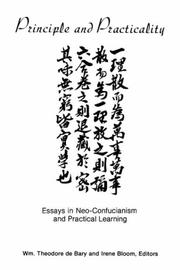
ISBN: 023104612X 0231046138 9780231046138 9780231046121 Year: 1979 Publisher: New York (N.Y.) : Columbia university press,
Abstract | Keywords | Export | Availability | Bookmark
 Loading...
Loading...Choose an application
- Reference Manager
- EndNote
- RefWorks (Direct export to RefWorks)
Neo-Confucianism. --- Practice (Philosophy) --- Néo-confucianisme --- Pratique (Philosophie) --- China --- Japan --- Chine --- Japon --- History --- Histoire --- Neo-Confucianism --- S12/0430 --- S35/0900 --- #SML: Joseph Spae --- Philosophy --- Confucianism --- Philosophy, Chinese --- China: Philosophy and Classics--Neo-Confucianists: general and Song (including lixue 理學) --- Japan--Philosophy --- -History --- -Neo-Confucianism. --- -S12/0430 --- Practice (Philosophy). --- Néo-confucianisme --- Nihon --- Nippon --- Iapōnia --- Zhāpān --- I︠A︡ponii︠a︡ --- Yapan --- Japão --- Japam --- Mư̄ang Yīpun --- Prathēt Yīpun --- Yīpun --- Jih-pen --- Riben --- Government of Japan --- Cina --- Kinë --- Cathay --- Chinese National Government --- Chung-kuo kuo min cheng fu --- Republic of China (1912-1949) --- Kuo min cheng fu (China : 1912-1949) --- Chung-hua min kuo (1912-1949) --- Kina (China) --- National Government (1912-1949) --- China (Republic : 1912-1949) --- People's Republic of China --- Chinese People's Republic --- Chung-hua jen min kung ho kuo --- Central People's Government of Communist China --- Chung yang jen min cheng fu --- Chung-hua chung yang jen min kung ho kuo --- Central Government of the People's Republic of China --- Zhonghua Renmin Gongheguo --- Zhong hua ren min gong he guo --- Kitaĭskai︠a︡ Narodnai︠a︡ Respublika --- Činská lidová republika --- RRT --- Republik Rakjat Tiongkok --- KNR --- Kytaĭsʹka Narodna Respublika --- Jumhūriyat al-Ṣīn al-Shaʻbīyah --- RRC --- Kitaĭ --- Kínai Népköztársaság --- Chūka Jinmin Kyōwakoku --- Erets Sin --- Sin --- Sāthāranarat Prachāchon Čhīn --- P.R. China --- PR China --- Chung-kuo --- Zhongguo --- Zhonghuaminguo (1912-1949) --- Zhong guo --- République Populaire de Chine --- República Popular China --- Catay --- VR China --- VRChina --- 中國 --- 中国 --- 中华人民共和国 --- Jhongguó --- Bu̇gu̇de Nayiramdaxu Dundadu Arad Ulus --- Bu̇gu̇de Nayiramdaqu Dumdadu Arad Ulus --- Bu̇gd Naĭramdakh Dundad Ard Uls --- Khi︠a︡tad --- Kitad --- Dumdadu Ulus --- Dumdad Uls --- Думдад Улс --- Kitajska --- -Neo-Confucianism --- J1440 --- Japan: Philosophy -- Confucianism --- China - History - Ming dynasty, 1368-1644 --- Japan - History - Tokugawa period, 1600-1868
| Listing 1 - 10 of 10 |
Sort by
|

 Search
Search Feedback
Feedback About
About Help
Help News
News